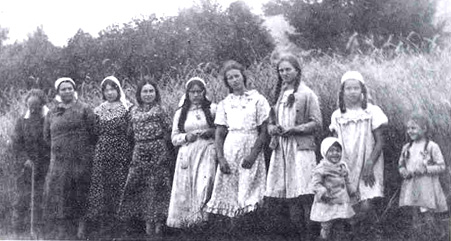|
Silingas in Exile
The Burial
Victims' Memorial
Aftermath
Genesis of a Nation's Songs
|
One of the symbols of Lietuva or Lithuania is the oak. Not only are there pagan rites about its significance, but to this day, the oak tree (azuolas) represents endurance, strength and integrity, and its leaves the beauty and fragility of life.
Lietuva is a word now often heard in all the Worthingtons' households, from California to Alaska.
Ironically, it is my grandfather, Stasys Silingas, whom I never saw, who is the catalyst in this phenomenon. He is the oak tree, and we, the war- blown descendants of Stasys Silingas, are like leaves scattered by a storm. Now the past and his legacy summon us. |
|
|

Lietuva |
|
|
Link
to the Past
I smiled outwardly, but I winced inwardly
when someone tried and then asked how to pronounce my name: Svaja.
"What kind of name is that?" the kids
would ask brazenly.
"Lithuanian," I’d reply.
"What ‘s that?"
"It’s a country in Eastern Europe
across the Baltic Sea from Norway and Sweden," I’d patiently
explain, hoping for some sign of recognition. But hardly anyone had ever
heard of Lithuania. Some even guessed it was a country in Africa -- even
today, even adults. The name does resemble Liberia, Nigeria, Libya, I
suppose. Most often though, they’d ask if my name was Russian.
I grew up keeping my Lithuanian heritage
in the background, bringing it out only when coaxed. Then I’d tell of
my grandfather. That information was with me always. I knew it by heart:
Stasys Silingas -- He was in the Encyclopedia
Britannica until 1953, he was Minister of Justice during the War
years, a patron of the arts, a writer, translator of Tagore and
Nietzsche, orator, Baron, father of nine daughters of whom my mother is
the oldest, -- arrested with his wife and a daughter by the advancing
Russians, separated from them, and imprisoned. His wife and daughter
died of starvation and disease within three years in a concentration camp
in Siberia. He was now in the Ukraine, still a political prisoner.
All my youth he was still a prisoner -- a
slave laborer, suffering even as we enjoyed the safety and comfort of
life in America. He survived for over twenty years until he was finally
released in 1961 to die in his native Lietuva (Lithuania). He was old,
sick, and physically broken but mentally and emotionally still alert.
Even then, in spite of the efforts of my parents and others, the Soviet
authorities would not allow him to join his surviving family either in
the United States or Canada or Australia -- not even to die.
If this haunted me, I did not show it --
other than to boast that my father was the best sugar beet farmer in
Lithuania, producing award winning crops, and that my mother was the
national ping-pong champ. In the friendly and mild climate of town and
country in Lietuva, they enjoyed a gentle, idyllic life -- until the
wolf came to the door.

Wolf at the Door
|